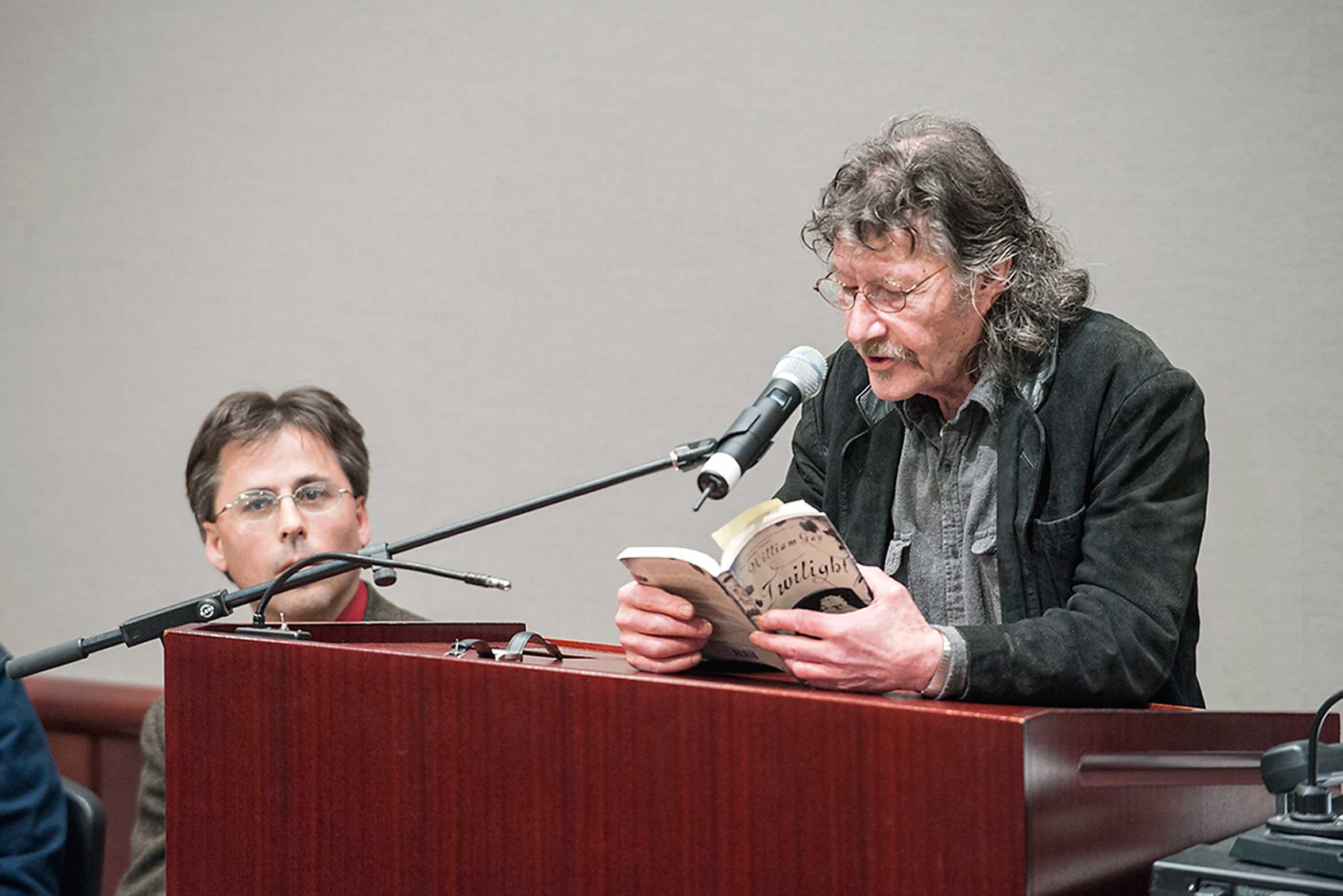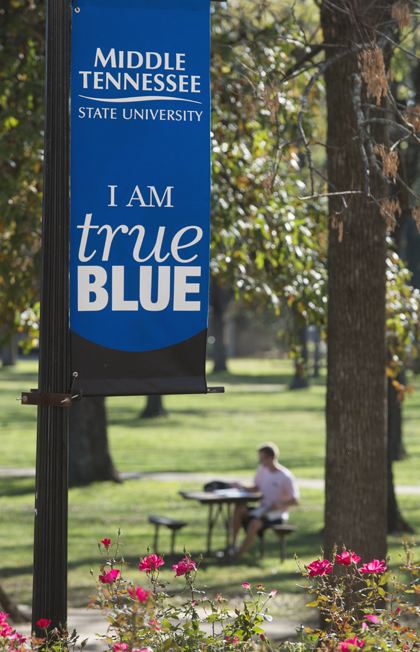
English
Enhance your expertise with a Ph.D. in English with specializations in Literature, Writing, Film, and more. Flexible options.
English, Ph.D.
The Doctor of Philosophy (Ph.D.) in English is offered through the College of Liberal Studies at MTSU and promotes the kind of dual specializations that provide a breadth of knowledge and are often sought in academic employment. Students may seek specializations in the fields of American, British, and Global English Literature; Composition and Rhetoric; Critical Theory; and Film Studies. Courses are designed as seminars, and graduate students may expect highly individualized attention from the graduate faculty.
Graduate study in English engages in the deep and intense study of literature and writing, language, and theory, undertaken for the special growth in knowledge and understanding of the world of human expressions and experiences that such studies bring. It also provides preparation and training for careers within and outside of the academy. Students who attain degrees in this program enrich each other through their diversity of experiences and perspectives and take the cultural and intellectual wealth of their interactions and knowledge into their communities with them as they integrate their lives beyond the seminar room.
Pursue the Doctor of Philosophy (Ph.D.) degree in English at MTSU with a nationally and internationally recognized faculty teaching diverse courses in literature, writing, film, and various expressions of language and culture. Students are encouraged to think and create freely within a structure that provides support from peers, guidance from faculty, resources for research, challenging goals, and rigorous standards. The relatively small size of graduate seminars allows for encouraging individualized attention. Assistantships are available, as well as awards and fellowships.
News Briefs

New Graduate Film Course on the British New Wave
Dr. Christopher Weedman's special topics graduate course "British New Wave Films" explores this social realist movement of the late 1950s and 1960s. New to the English Department's graduate curriculum, this course is one of the few graduate courses devoted to this gritty and rebellious group of films on this side of the Atlantic. These films provide a frank depiction of the working class and the changing attitudes about gender, race, and sexuality in post-World War II Britain.

Faculty and Graduate Students Work with Archival Documents
When Holocaust survivor Nessy Marks passed away in 2011, her son donated to the English Department one of her most valued possessions, a collection of thank-you letters written to her by the children from the many schools and places of worship she visited during her lifetime. In Spring 2019, Dr. Kate Pantelides' graduate students began cataloging and analyzing this archive. Is Summer 2019, Ms. Lauren Blade began the process of digitizing the archive, and Ms. Elizabeth McGee plans to seek grant funds to continue this work. Ms. McGee, Ms. Abbie Moody, and Dr. Pantelides recently submitted an article based on this work to Peitho: Journal of the Coalition of Feminist Scholars in the History of Rhetoric and Composition. The manuscript describes their efforts to recover, preserve, and analyze the letters in this archive. They highlight two trends in these letters: that of writers to affiliate with Ms. Marks through a sense of patriotism and duty, or through ancestry as a way to connecting to guilt and pain.
News Briefs
New Graduate Film Course on the British New Wave

Dr. Christopher Weedman's special topics graduate course "British New Wave Films" explores this social realist movement of the late 1950s and 1960s. New to the English Department's graduate curriculum, this course is one of the few graduate courses devoted to this gritty and rebellious group of films on this side of the Atlantic. These films provide a frank depiction of the working class and the changing attitudes about gender, race, and sexuality in post-World War II Britain.
Faculty and Graduate Students Work with Archival Documents

When Holocaust survivor Nessy Marks passed away in 2011, her son donated to the English Department one of her most valued possessions, a collection of thank-you letters written to her by the children from the many schools and places of worship she visited during her lifetime. In Spring 2019, Dr. Kate Pantelides' graduate students began cataloging and analyzing this archive. Is Summer 2019, Ms. Lauren Blade began the process of digitizing the archive, and Ms. Elizabeth McGee plans to seek grant funds to continue this work. Ms. McGee, Ms. Abbie Moody, and Dr. Pantelides recently submitted an article based on this work to Peitho: Journal of the Coalition of Feminist Scholars in the History of Rhetoric and Composition. The manuscript describes their efforts to recover, preserve, and analyze the letters in this archive. They highlight two trends in these letters: that of writers to affiliate with Ms. Marks through a sense of patriotism and duty, or through ancestry as a way to connecting to guilt and pain.
Related Media

English Ph.D. Careers
The Ph.D. program in English enjoys a highly successful placement record for its graduates. Some potential professional careers include:
- academic/university official
- academic or career advisor
- advertising/public relations executive
- archivist
- college professor
- content manager
- creative writer
- director/support staff for non-profit organizations
- editor
- instructional designer
- lawyer (after law school)
- librarian
- manager
- playwright
- professional/technical writer
- public servant
- publisher
- reporter
- researcher
- reviewer
- school administrator
- software developer
- teacher
- writing coach
Present and past employers of MTSU English Ph.D. alumni include
- University of Alabama, Huntsville
- Alabama State University
- Appalachian State University
- Aquinas College
- University of Arizona
- Belmont University
- C. S. Lewis Foundation (Oxford, England)
- University of Cincinnati
- Columbia State Community College
- Covenant College
- Cumberland University
- University of the Cumberlands
- Daytona State College
- Fisk University
- GardaWorld/Feisty Records
- Georgia Institute of Technology
- Goodworks Global Ministries
- IQTalent Partners, Inc.
- Ingram Books
- Ingram Content Group
- Judson College
- Kansas State University
- Kennesaw State University
- King Saud University
- Langston University
- Lipscomb University
- Longwood University
- Metro-Nashville Public Schools
- Michigan State University
- Middle Tennessee State University
- Missouri Valley College
- University of Montana
- Motlow State Community College
- University of North Alabama
- University of North Carolina, Pembroke
- Northern Borders University
- Northern Virginia Community College
- Northwest University
- Roane State Community College
- Rust College
- Rutherford County Schools
- Savannah State University
- Southern Adventist University
- University of Southern Indiana
- State University of New York, Adirondack
- Sumner County Board of Education
- Talladega College
- Tennessee State University
- Tennessee Technical University
- Texas A&M University
- Tishreen University
- Trevecca Nazarene University
- Umm Qura University
- Virginia Polytechnic Institute and State University
- Volunteer State Community College
- Watkins College of Art and Design
- West Virginia Higher Education Commission
- Western Kentucky University



Admission Process for Graduate Program in English:
You may apply on-line or by filling out and sending in an application (found in the back of the graduate catalog). A $35 application fee is due at the time of application. In order to complete your application, you will need to see that the following materials are sent to the College of Graduate Studies, Sam H. Ingram Building, MTSU Box 42, Murfreesboro, TN 37132:
- All undergraduate and graduate transcripts
- Three letters of recommendation (These can be emailed to [email protected])
- GRE scores (We look primarily at the Verbal and Analytical portions of the General exam; the English subject test, though not required, is recommended.)
- A short statement of purpose (500 words or so) in which you present your reasons for wishing to pursue graduate studies in English (your professional plans, areas of interest, etc.) as well as any relevant experience that prepares you for graduate studies.
APPLICATION DEADLINES for fall semester admission:
February 1st for those wishing to be considered for graduate assistantships
March 1st for all others
APPLICATION DEADLINES for spring semester admission must be completed by October 1.
For more information, visit the English Department section of the Graduate Catalog, Graduate English Student Resources, and Admissions to the College of Graduate Studies.
For more information, visit the English Department section of the Graduate Catalog and Admissions to the College of Graduate Studies.
Assistantships
If you would like to be considered for a graduate assistantship, in addition to the material required for the general application, you will need to fill out an application for an assistantship and send it to the Director of Graduate Studies in the English Department (P.O. Box 70, Department of English, Middle Tennessee State University, Murfreesboro, TN 37132) along with a short statement of purpose (500 words or so) in which you present your reasons for wishing to pursue graduate studies in English (your professional plans, areas of interest, etc.) as well as any relevant experience that prepares you for graduate studies.
M.A.-level graduate assistants:
Until students have completed 18 hours of course work, they are generally assigned as tutors in the Writing Center for 20 hours a week. Some students may be given 20-hour assignments to work as a classroom assistant for particular professors. Once students have completed 18 hours of course work, they may serve as teaching assistants, under the guidance of our supervisor of teaching assistants. During their first year teaching, they are required to enroll in Seminar in Teaching Composition (ENGL 6560/7650).
Our M.A. assistants receive a stipend of $6500 distributed over a nine-month period with a waiver of tuition fees and out-of-state fees if the GA is a non-resident.
Ph.D.-level graduate assistants:
Doctoral level assistants are generally given teaching assignments (two courses a semester), if they have some previous tutoring or teaching experience. If they have not already taken appropriate pedagogy courses, they will be expected to take our two pedagogy seminars the first year. Doctoral-level stipends are presently $14,000 for a twelve-month contract, with a waiver of tuition and fees.
For more information, visit the MTSU Graduate College site.
Awards
In addition to providing full tuition to graduate assistants, MTSU rewards excellence by offering the Albert and Ethel Carver Smith Award ($2,000). In addition, the English Department offers the following awards to qualified graduate students:
- the Peck Award ($1,500)
- the Frazier Writing Award ($200 for first; $100 for second)
- the William R. Wolfe Award (given for the three best essays of the year by a graduate student; prizes vary)
- the John McDaniel Excellence in Teaching Award
Other Resources
Please visit the department's grad student resources page for more information.
Related Links

CONTACT US

Please fill in the form below and we will contact you very soon












